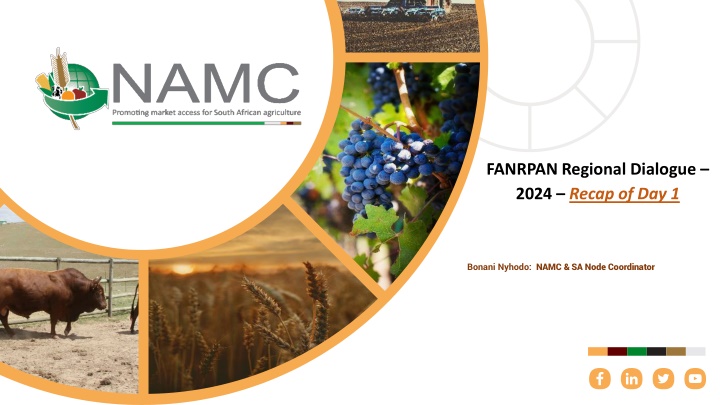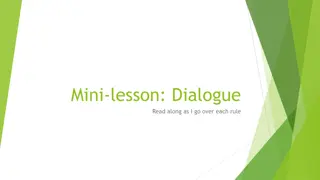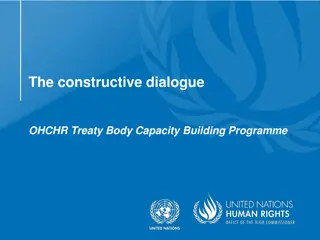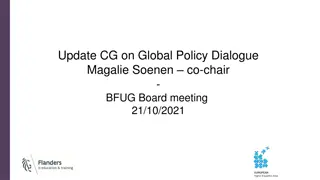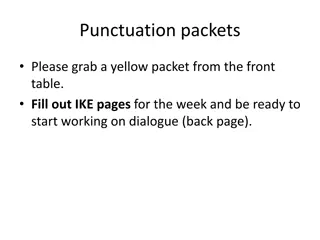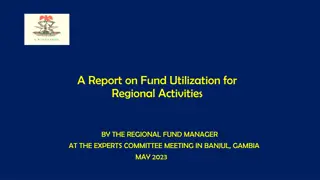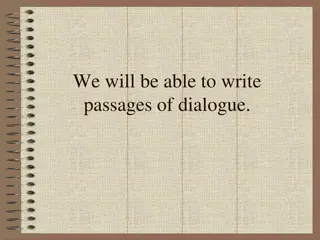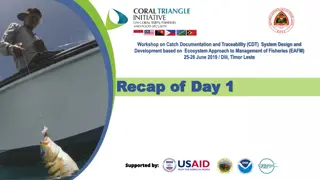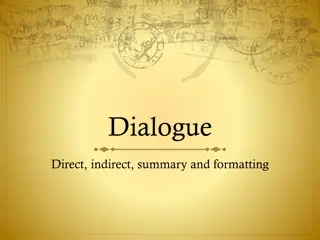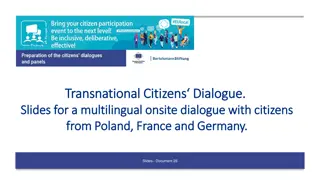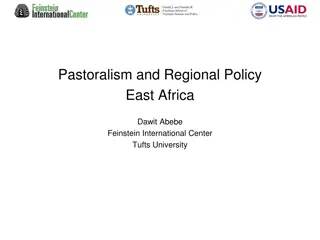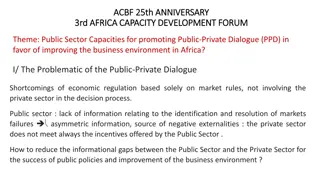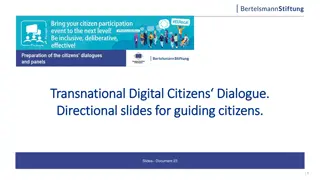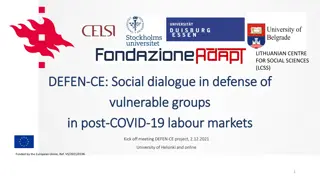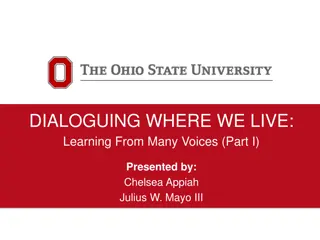Recap of FANRPAN Regional Dialogue Day 1
Recap of the first day of the FANRPAN Regional Dialogue 2024 featuring insights on policy and research pathways to transform food systems, addressing challenges in agriculture, and promoting inclusive development in Africa. Key speakers highlighted the importance of evidence-based policies, stakeholder engagement, and the role of youth in shaping future food systems.
Download Presentation

Please find below an Image/Link to download the presentation.
The content on the website is provided AS IS for your information and personal use only. It may not be sold, licensed, or shared on other websites without obtaining consent from the author.If you encounter any issues during the download, it is possible that the publisher has removed the file from their server.
You are allowed to download the files provided on this website for personal or commercial use, subject to the condition that they are used lawfully. All files are the property of their respective owners.
The content on the website is provided AS IS for your information and personal use only. It may not be sold, licensed, or shared on other websites without obtaining consent from the author.
E N D
Presentation Transcript
FANRPAN Regional Dialogue 2024 Recap of Day 1 Bonani Nyhodo: NAMC & SA Node Coordinator
Outline 1) Take home 2) Official opening 3) Policy pathways to transformed food systems 4) Research pathways to transformed food systems 5) Food systems transformation in a changing climate 2
Take: day 1 Policy pathways towards transforming Africa s agriculture and food systems It was a good day, Presenters did a starling work, The audience was attentive (and engaging), The hotel venue was/is good to us, High level delegates in attendance of the dialogue, and Presentations were engaged through the panel discussions. 3
FANRPAN Chair Appreciated Secretariat for a job well done, Policy dialogue setup is the future approach, Inclusive and driven development, Policies must be based on science (evidence based), Partnerships: beneficiary, and Agricultural problems - country borders. Programme Director Established protocol, Offered prayer, Indicated 2008 (last host). Welcomed all delegates Malawi: what comes to mind? partnership Minister of Agriculture Recognized protocol as established, Welcomed all delegates to Malawi, Promised those visiting (1st) that they come back, Outlined that agriculture is one of core industries (in Malawi 25% of GDP), Africa envisioned (food secured Africa) serving the people, Looking forward to learn from the delegates as Malawi, Outlined Malawi s including the Lake. Declared the dialogue officially opened. mutually FANRPAN CEO FANRPAN as a network of networks (CISANET) stakeholder owned, Dialogues since 2001 Core-creation jointly map the way forward (dialogue), Knowledge transfer, Actionable recommendations, Forging partnerships CISANET Chair Outlined that CISANET is made up of over 60 member org, Policy discussions need to be followed by implementation, Technology adoption must be deliberate and one size fits all approach minimised/avoided. Research recommendations need to be used. tourist attractions
Policy pathways to transformed food systems
LEAD PRESENTATION OVERVIEW OF PERFORMANCE Role of policy in food systems DISCUSSION (INVITED INPUTS AND DIALOGUE) Policy coordination: SADC not doing as well as we wish, Protocols get signed with delays in domestication of such, Progress is visible on some trade facilitation problems (single border posts), Sub-Saharan Africa continue to have agric as one of the core, Stakeholder roles in the PPP arrangements need to be clarified, Youth need to be part of the solution in addressing food systems, Use case studies to inform policy direction (youth involvement), Youth active in policy development in Malawi, Scientists should learn to communicate with policy makers (and vice versa), The same way science was used during COVID-19 (its contribution remains urgently needed), Value chain based policy programming Recognition many actors in any food system (with conflicting interests), It become very important to map actors for the system to be understood clearly, Rationale for food systems transformation Hunger and malnutrition, Environmental degradation, and Social inequity. Current problem Extreme weather events, Biodiversity losses, and Water and pollution challenges Policy proposals Incentives (to drive the desired practices), Investment in innovation (and follow diffusion levels) Address issues relating to unfair trade policies We produce what we do not consume and consume what we do not produce: argument for trade (is trade the problem or trade deficit?) 7
Research pathways to transformed food systems
LEAD PRESENTATION OVERVIEW OF PERFORMANCE Climate change is bringing along different gifts to different regions, Eastern Africa - wet, while Southern Africa: dry and hot (oblique future for some crops). DISCUSSION (INVITED INPUTS AND DIALOGUE) Investment in crops that have not benefited from support (small grains some of which are indigenous), Invest in dryland research and gene bank development, Uptake normally occurs when intervention are aligned to national priorities, Climate proofing of any policy intervention Appreciations of the complexities of food systems need not to be taken for granted, Transdisciplinary approach seem to be the new normal in untangling the challenges of food systems research (FOSTA Health), Appreciation of non-science examples in addressing these complex science matters, An appreciations that research must drive policy direction, Systems governance is very important in R&D, A close synthesis of the political economy of foods (associated intellectual property right royalty payments) and climate change. The impact or productivity: Low yields, and Increased frequency and intensity of extreme weather events. Climate change models project that main crop supply and demand will shift (negative) 2050. Policy development (IFPRI model) was participatory: To correct assumptions, To ensure deeper understanding of the practicalities of policy development and implementation. the misinformed The concept of the invisiblehand in misguiding us policies developed and not implemented. I assume this invisible hand is not the one Smith argued in the Wealth of Nations. 9
Food systems transformation in a changing climate
Bringing it together To progress we need to pay attention to scaling (up, out and deep) came out as one of actions we need to consider if we are to progress. Policy, practise and dietary transitions were discussed, Three countries of focus of the study (Malawi, Zambia and Tanzania), Qualitative approach used in the case study to address nuances of cultural importance, The emergence of shift from under-nutrition to over-nutrition is a new reality, Increases in non-communicable diseases Focus on Malawi with irrigations demands under different scenarios discussed, The emergence of the concept of climate smart irrigation landscape to avoid irrigation amplifying the problems, Use of resource endowment and a basis of food systems adjustments, Ensuring the protection of the health of all actors of the food system, Outlined issues that are directly affected as well as those that are affected indirectly, Consumer behaviour and pollinators lifted among important variables in the whole food systems equation, and The matter in respect of sector prioritisation as a mean of optimising on the use of limited water resources. What lessons can we learn from the parallel sessions? 11
Closing remarks Prayer before birth Louic MacNiece ( Let them not make me a stone and let them not spill me. Otherwise kill me ). ? Focus & courage Sonnet 116 William Shakespeare ( If this be error and upon me proved, I never writ, nor no man ever loved ) Remember what Achebe says ( until lions have their history, the history of the hunt will always glorify the hunter ) 12
Contact Details: Private Bag X 935, Pretoria, 0001 536 Francis Baard Street, Block A, 4th Floor, Meintjiesplein Building, Arcadia, 0007 Tel: 012 341 1115 Fax: 012 341 1811 Email: info@namc.co.za Website: www.namc.co.za
